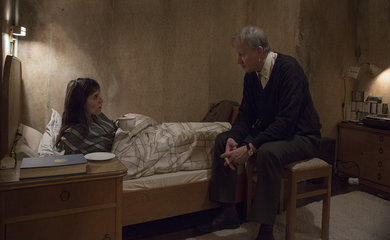How do you distil 50 years of life into just 5 hours? What unique qualities of the human condition are worth filming and preserving for eternity? How do we select the stories that define our existence and how much do we truly recall with clarity? How much of our memory is padded by dreams or protected by time? Are we by design unreliable narrators as our memory tries to shield us from the true horror of our own fragility? Or are some of us fated to tell the truth no matter how much it can damage our souls? If we are defined as human beings through encounters with other human beings then are our touchstones bound to those encounters that are the most intimate?
Lars von Trier’s “Nymphomaniac” is an epic sojourn into the heart of his tragic heroine Joe. The black screen makes us wait for the salacious content provoked by the title and the sweaty contorted posters of A-list stars in mid-coitus. How will the grand provocateur of world cinema shock us with his depiction of sex on screen? Should we still be shocked by the very act that propels mankind across the generations? Is the penetration really a digitised union between porn star and real star? If so why is one commodity treated differently from another? Are they somehow less human or maybe more so than their Hollywood counterparts?
Joe is found in a snowy back alley battered and abused at the end of a slow, creeping and deliberate camera move. She is scooped up by an aging Samaritan and taken in for “a cup of tea. With milk” preferring to avoid the probing comfort of an ambulance or the police. Her Samaritan, Seligman, is infinitely more probing than the rebuffed emergency services. He lives a Spartan existence exercising his considerable mind in the pages and symphonies of academia, the sum total of which are seemingly destined to be applied to psychoanalyse just one person in the world: Joe the nymphomaniac.
“I’ll have to tell you the whole story. It’ll be long,” Joe politely warns Seligman as he tucks her into his bed. She has the precise diction of the English middle class, a voice that can even make the word cunt sound like it has impeccable manners. Various artefacts in Seligman’s religious cell of a room provide the inspiration to each chapter of Joe’s story and the means by which the cloistered Seligman can interrogate Joe and try to apply her agony and ecstasy to his own proxy artificial sensations of life experienced through a mind replete with second hand knowledge.
The chapters of Joe’s life are a diverse journey into a woman’s sexuality and the useless facts collected by a man who claims to be asexual. Each chapter is masterfully crafted with visual asides and aural deviations as Joe questions her morality and place in the world. With wonderfully evocative titles such as, The Compleat Angler, Delirium and The Eastern Church and The Western Church (The Silent Duck), Joe’s labyrinth story unfolds into a pseudo Greek tragedy, pregnant with coincidence and grueling in the misery that her addiction continues to heap upon her against the pleasures it once delivered. Joe is philosophical about her fate. “It’s my own fault. I’m just a bad human being.”
Is Joe punished for being a woman daring to flaunt her sexuality in a patriarchal society or simply ground down by an addiction in the same manner as a drug addict or alcoholic? Is Joe really savaged by men because she says, “perhaps the only difference between me and other people was that I’ve always demanded more from the sunset; more spectacular colors when the sun hit the horizon. That’s perhaps my only sin.” The more she demands through her sexual exploits and the emotional abuse she subjects herself to because of them, now seem to haunt her every expression and drain the colour from her skin. Her youthful vibrancy is wrenched away one man at a time.
“Nymphomaniac” is a draining yet exhilarating experience, cathartic in places and crushingly nihilistic in others. The sex is often repulsive, embarrassing, passionate and ordinary and tellingly the least interesting part of the Lars von Triers Magnus opus. Charlotte Gainsbourg as Joe and Stacy Martin as Young Joe are fiercely courageous, melancholy, touching and funny as they take us through Joe’s Odyssey of abandonment from human feeling and her attempt to recreate herself as a human being once more. Many great actors ably support them but the most affecting is Christian Slater as Joe’s father instilling in her a passionate love of trees and nature.
Two scenes amongst many strong scenes stand out in particular. The first a heart-breaking abortion conducted at home. The second the final climatic act between Seligman and Joe when she says to him “thanks to my new and perhaps first friend.” Seligman smiles and leaves her to sleep peacefully her story now told. He shuts the door behind him and the camera watches it solemnly. Why do we get the feeling we have just witnessed one more vignette in her tumultuous life rather than the closure she desperately craves? How will Joe title this chapter? The devil is in the detail heard behind a black screen signifying the movement of a human being.

